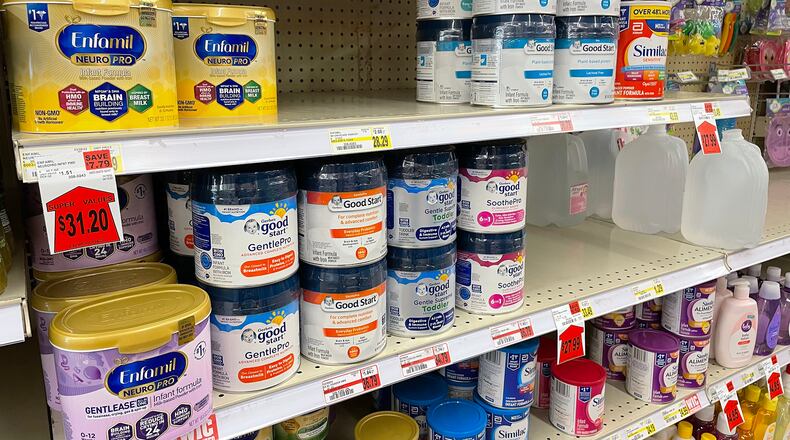“In particular, specialized formula may be harder to find,” said Public Health - Dayton & Montgomery County spokesman Dan Suffoletto. “If a child has been prescribed a special formula by a doctor, the parents may speak to their doctor to see if any adjustments could be made to the formula.”
In Springfield, Groceryland Manager Shawn Moser said the store on South Limestone Street has been able to continue acquiring formula that some have gone without. However, he says the formula on the shelves goes quickly.
“We get a lot of phone calls on a day-to-day basis,” he said. “People trying to track down certain formulas.”
Moser recommended people call ahead before visiting stores to check stock, adding that staffers ask for understanding in a challenging time for the supply chain.
“With manufacturing issues and distribution issues, it’s hard,” he said.
The Clark County Combined Health District said the local Women, Infants and Children’s office continues to closely monitor the shortage.
“We are working to provide regular feedback, information, and guidance,” the health district said. “We understand and appreciate the sense of urgency at hand and will continue to work with all stakeholders to identify potential resolutions and remedies regarding this situation.”
WIC is a federal program that helps mothers and children get nutritious foods and safeguard their health.
Cindy Meale, the WIC program director in Butler County, said participants in the county have called daily to express the struggles they are having finding formulas. Shortages were seen in prescription formulas first, but the issue has now ballooned to nearly all formulas.
“It is hard right now and it’s stressful for our families,” she said.
Months of spot shortages at pharmacies and supermarkets have been exacerbated by a recall at Abbott, which was forced to shutter its largest U.S. formula manufacturing plant in February due to contamination concerns.
On Monday, White House press secretary Jenn Psaki said the Food and Drug Administration was “working around the clock to address any possible shortages.” And on Tuesday, the FDA said it was working with U.S. manufacturers to increase their output and streamline paperwork to allow more imports.
Pediatricians and health workers are urging parents who can’t find formula to contact food banks or doctor’s offices. They warn against watering down formula to stretch supplies or using online DIY recipes.
Meale said with the supply issues, pregnant women should consider making the decision to breastfeed after giving birth. She said WIC has programs set up to assist women who choose to breastfeed.
Montgomery County officials also said that babies can benefit from breastfeeding.
“Mothers in Public Health’s WIC program can get advice about how to get started breastfeeding,” Public Health said. “Breastfeeding is good for both mothers and their babies. Breast milk is the best source of nutrition for most babies. As your baby grows, a mother’s breast milk will change to meet his or her nutritional needs. Breastfeeding can also help protect the mother and the baby against some short- and long-term illnesses and diseases.”
The Associated Press contributed to this report.
Tips from local health departments about baby formula shortage
- Do not dilute formula you have to try to make it last longer, doing so will alter the nutritional makeup of the formula.
- Call the store first and ask for product availability.
- Ask a store worker if there is more formula in the back if there is not any on the shelf.
- Ask when the next shipment arrives.
- Ask when shelves are usually stocked.
- Talk to the pharmacy to see if they can help.
- Do not wait until end of the month to purchase your benefits.
- Call your child’s healthcare provider about prescribing an alternative specialty formula if the one currently prescribed is unavailable or difficult to find.
About the Author

